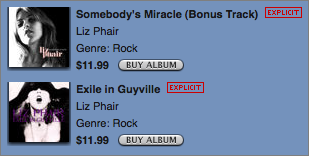Reasons for DRM on Independent Content
Material:
Would Apple Mix DRM and Non-DRM Music at the iTunes Store?
Thoughts On Thoughts On Steve Jobs Thoughts on Music Minus Macrovision's Response
John Gruber has an interesting little piece on Apple mixing DRM and Non-DRM music on iTunes. In it, he touches on the possible design complications of selling both forms of content. Essentially, he doesn't see the potential problems as technological in nature, but instead as design problems.1 Whatever people might say, it's not easy to simply just sell content with mixed user rights without running into a lot of consumer confusion. Consumers don't generally see the music they buy from iTunes as a music file with DRM attached to it, but instead as a single track they bought for 99 cents.
One of Gruber's points about adding visual tags to signify DRM protected content is that Apple already has similar badges for 'Explicit' and 'Clean' content. Yes, such a point is valid, however, the difference between DRM'ed and non-DRM'ed content is far more significant than the difference between Explicit and Clean content. Explicit and Clean content can pretty much be used in much the same way. That situation just isn't possible with DRM'ed and non-DRM'ed content being sold at the same location.
Yes, such a point is valid, however, the difference between DRM'ed and non-DRM'ed content is far more significant than the difference between Explicit and Clean content. Explicit and Clean content can pretty much be used in much the same way. That situation just isn't possible with DRM'ed and non-DRM'ed content being sold at the same location.
All of this carries over into their products. The iTunes Music Store would not have taken off if it weren't for the extremely straightforward design and experience. Every song costs 99 cents and every song has the same set of user rights. In essence, this states that no song is 'better' than the other, that every song is worth the same and has the same value. So then if some music has DRM on it and some doesn't, then what is different about the music that does not have DRM? Why does it deserve better user-rights?
The fact is is that it doesn't and because of that consumers aren't going to understand the reason why: The labels want it that way.
Of course, it seems like a simple enough concept: some music labels want DRM on their music and others don't. But people don't buy music based on what label it has been published by. Few people subjectively think that Warner Bros. 'makes' better music than EMI in the same way that most people subjectively think that one movie is better than another3. Once this way of thinking is taken into consideration, making the user-rights of one artist more open than the user-rights of another artist will just end up making the consumer feel as if the differences are just arbitrary.
That's not to say that people won't understand. In fact, it's possible that most people will understand. However, by most people, I mean most individuals. As a group, people tend to think differently than as individuals. In the end, all it will do is make the user-experience more frustrating for the actual user, resulting in overall dissatisfaction with the product.
However, in the event where just one of the major music labels does allow their music to be 'un-DRM'ed', my thoughts would be just as John Gruber's:
But now that Apple has published Steve Jobs’s “Thoughts on Music” essay, if one of the major music companies were to step up and say, OK Apple, go ahead and sell our songs without DRM, I think it’d be hard, if not downright impossible, PR-wise, for Apple to say they won’t allow it until the other companies agree, too.
I agree entirely. An entire major music label's catalog of music on iTunes in a non-DRM'ed format is a significant enough of chunk of music that I think would cover enough people's music purchases to make it worth it. Of course, people will still probably get frustrated, but such a move would be made moreso to pressure the other labels into following suit.
Note:
Originally, I believed:
I actually think that something is stopping Apple from selling this music in an unprotected format. I think it's a very real possibility that the music labels force Apple to sell all of their music in a protected format...
No one has been able to confirm this, but I still think it's the case.
That could still very well be the case, but I guess I've changed my mind on the matter.
1: This seems to be the way most of the consumer electronics/computer industry works. They only ever see technology problems and never design problems. Their line of thinking is: If you have the technology, why don't you use it?
2: It still hasn't made the Mac as big of a hit as the iPod.
3: People feel that way about the artists that actually make the music.



5 comments:
I still have a problem with the Get-A-Mac ads. Macs are better at some things and are worse at others. To say that one is simply better than the other is like saying an apple is better than an orange. Which is simply not true. Those fruit have different uses. One is for eating, and one is for juggling.
I don't usually complain about these ads though, because a consumer that expects objective viewpoints from a commercial is a stupid consumer indeed.
^I agree entirely. That's why I used the word subjective:
The Get A Mac ads simply state that the Mac is, through a series of subjective comparisons, better
And for that, I thank you.
So I have finally got around to replying to your post. Obviously, I disagree with you a little :P.
Post a Comment